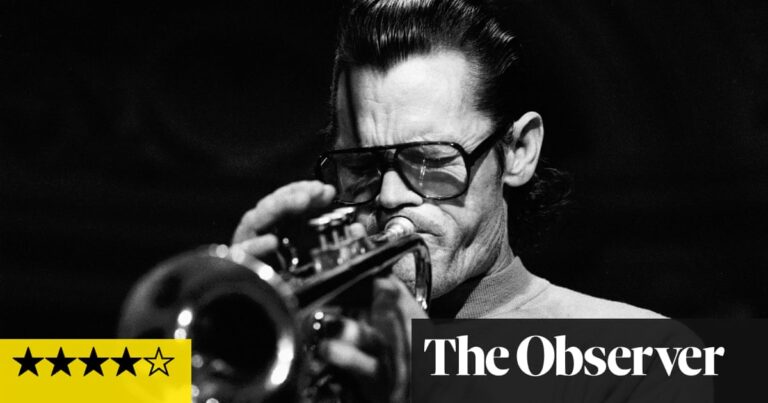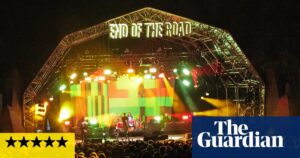‘And Ticketmaster crashed!” Stuart Maconie kicks off the in-demand Supersonic pub quiz on Sunday with a riff on the festival’s entirely unintentional namesake, who a day prior broke the internet with demand for their upcoming reunion shows and spurred talks of government action on the ticketing market. At the risk of stating the extremely obvious, the name is where any comparisons end: held in two venues in Digbeth, Supersonic festival doesn’t trade in crowdpleasing anthems but noise from the fringes, serving a 1,200-strong clientele whose loyalty to the festival is evident in the prevalence of merch from artists who played last year (primarily US doom metal act Divide and Dissolve). Nor does it have anything to do with reductive Britpop nostalgia, with elements of this year’s programme reflecting and deepening recent fringe interrogations into British identity and folk tradition.
Partially that focus is the unintentional result of a lineup that feels quite a bit less international than last year’s: maybe that was intentional programming; maybe it’s indicative of the financial situation of a festival like Supersonic, which has to fight for funding (it has support from Arts Council England and other bodies) and certainly isn’t prompting the government to support the endurance of the UK’s pivotal DIY scenes. As Luke Turner wrote in the Quietus earlier this year, if the government deigns to touch on the importance of the country’s grassroots venues, it’s only ever in terms of the future superstars they might nurture, a myopic success-oriented mindset, rather than “as places in which music is played for the sake of communal joy”. And those struggles are writ large within Supersonic’s existence: even since last year, gentrification in Digbeth meant that the festival had to find a new venue at the last minute, as artistic director Lisa Meyer writes in the programme.
And so it is to the hastily booked O2 Institute on Friday afternoon for Gazelle Twin, AKA Elizabeth Bernholz, who has ditched the masks and grotesque costumes she once wore on stage for a sleek pale green silk suit – to look like an 80s medium, she tells Maxine Peake in a live Q&A on Saturday – as she plays songs from Black Dog, an album about feeling haunted by her childhood home. The volume is Sunn O)))-level loud, shivering tectonically and inducing a sense of bodily horror as Bernholz reclines in an orange armchair and hisses that she’s “always watching … waiting”. Her sustained, ominous synth notes are nicked by scratches of metal and chilling piano refrains, creating a genuinely creepy atmosphere – though the set is pretty heavy on atmospherics, and it’s hard not to crave a refreshing blast of the frenetic gnashing from her 2018 album Pastoral.
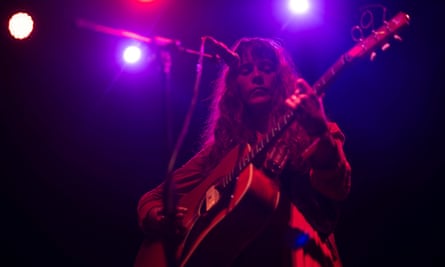
That meditative intent seems shared by many of the British and Irish acts on the bill. Self-described “Welsh-language gothic rock power-coven” Tristwch Y Fenywod come off like vaporwave Siouxsie and torture genuinely uncanny sounds out of a lap guitar; Shovel Dance Collective banjo player Jacken Elswyth plays exploratory ambient epics – including a cover of a border pipes tune that pits a finely scraped drone against a lovely, skittish melody – with a sense of focus that resounds with care for her source material. Cornish guitarist (and sometime singing drummer) Daisy Rickman plays a sublime full-band show that feels as though it stops time: the players are locked together in a Krautrock-worthy folk rumble that starts to bristle as it grows in intensity. It’s a sound you can imagine reverberating down the Lizard peninsula and out to sea, their scope is so limitless; Rickman’s astonishing low voice, however, can hardly be contained by her microphone, bleeding out as she incants about “the day we turn to dust”. Although harpist Mary Lattimore hails from Los Angeles, she recorded her 2020 album Silver Ladders in Newquay with Slowdive’s Neil Halstead, and her iridescent sound is heart-in-mouth stuff, sometimes deconstructing beauty with distortion; other times pushing beauty almost to the point of overdrive, of too-much-ness.
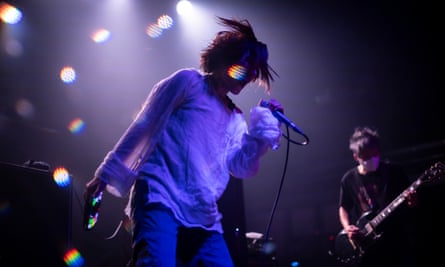
Last year’s headliners Lankum are headlining End of the Road this weekend, but they’re still here in two parts: One Leg One Eye – the Ian Lynch half – build an incredible drone from elongated fiddle, distortion and what starts as a surprisingly proggy chord motif that then morphs into something like a ship’s horn; the refrain blares over and over until it becomes an overwhelming wall of noise. Meanwhile, singer Radie Peat’s band ØXN maintain a fierce sense of tension as they bring new-wave touches to their folk-drone material (including a cover of Scott Walker’s Farmer in the City); final song Love Henry is a blaring cacophony of voice and accordion that grows ragged like a ship’s sail shredding in a storm. The Lankum dominance is justified; no worries about an undue monopoly here.
You could speculate about that internal focus into British and Irish identity – an attempt to go beyond preconceived ideas, to create new rituals, to exorcise the old ones, perhaps – or, like the Punch & Judy Extravaganza on XOYO’s rooftop on Saturday afternoon, simply send it up in a very fun, mind-boggling mish-mash of puppets, bubbles, red-and-white plastic market stall covers and acid-mangled sounds. And there’s much noise and extreme energy to counter all the introspection. Japanese noise icons Melt-Banana have been at this more than 30 years but still sound fresh out of the traps – to be exact, like a bulldozer driving out out of the traps over 1,000 Gameboys, in the first few minutes at least. It’s a breathless, careening windmill of noise, cataclysmically fun and prompting a joyful pit and tons of flung cups.
Birmingham hardcore band Flesh Creep “grew up coming to this festival so to be on this stage right now feels pretty fucking cool if you ask me!” says singer Tom Patrick – and cooler still, they share it with two local female singers, including Evie Thresher, whose Birmingham-accented roar is a rare tonic. But the greatest revelation is Los Angeles black metal band Agriculture, who bring great whirring tornadoes of guitar and drums that sound like Godspeed You! Black Emperor at their most magisterial, manic extreme, playing with clarion intensity, breathless and beaten. Strikingly, guitarists Dan Meyer and Richard Chowenhill play with huge beams on their faces – as if in awe of their own noise – while singer Leah B Levinson screams, seemingly in agony, at one point sounding etiolated and faded, genuinely ravaged by her efforts, or by the awesomeness of the forces she’s trying to counter. There are pockets of post-rock calm, like mist over a battlefield; drummer Kern Haug plays abstract fills that sound as though they’re creeping up on themselves as he plays. Gorgeous, miraculous stuff.
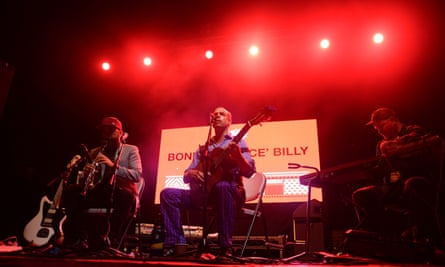
Bonnie “Prince” Billy was also headlining End of the Road this weekend, and it’s testament to Supersonic’s unique offering that it can lure him to a festival with literally less than one-tenth as many punters. Resplendent in pink and purple striped dungarees, Will Oldham and sideman Thomas Deacon sing (and whistle) in moving harmony; respecting the rigours of country songcraft but also unsettling them with off-kilter notes and Oldham’s ardent, almost overripe earnestness. Bananas may play like a spoof love song but it’s delivered with true sincerity; they play a featherlight I See a Darkness with a gorgeous, wiggly clarinet middle-eight courtesy of Deacon, which Oldham dedicates to Harmony Korine’s new film Baby Invasion, prompting someone to lob a pint, confusingly.
Some music festivals are containers – just a convenient platform for a bunch of bands, often heavily branded, filled with big-name artists who might never meet each other there or anywhere. Others are catalysts and cultivators – places where connections are made, communities are sustained and future collaborations may take root. The inspiring, tenacious Supersonic is one of the latter, and for anyone still in doubt of its value, for even a relatively blockbuster (in this context) artist like Oldham, decades-established in his own right, it remains integral. “I am friend and/or fan of so many acts performing here this weekend,” he tells the crowd. “It just feels cosy and homey and just wonderful. We don’t get to see everybody ’cos the schedules are a little whack – for a performer. But I guess you’re enjoying yourself because there’s no real excuse not to.” It’s a lot easier to get in to Supersonic than any headline-hogging superstar tour. But that doesn’t make it any less rare.
-
Supersonic festival
Source: theguardian.com











